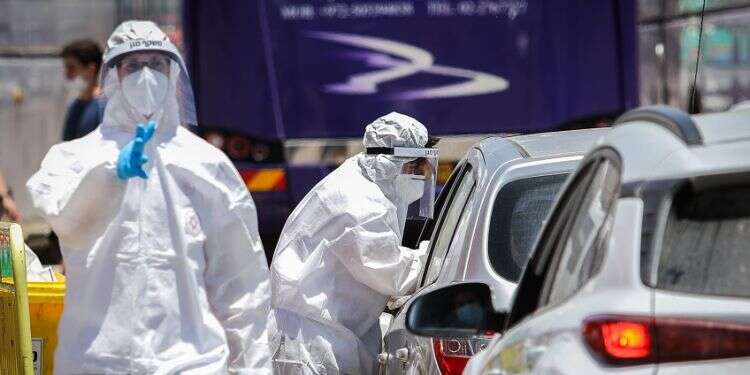Close to 1,000 new coronavirus cases have been identified in Israel in the past 24 hours, the Corona National Information and Knowledge Center reported Thursday. As of midnight between Wednesday and Thursday, 967 new cases had been confirmed nationwide. According to the center's daily update, released Thursday morning, the total number of active cases stood at 8,479 as of midnight.
On Wednesday evening, the cabinet approved partial closures on the cities of Ashdod and Lod, which have seen a surge in the number of coronavirus cases among their residents.
Follow Israel Hayom on Facebook and Twitter
According to the Corona National Information and Knowledge Center, the communities of Bnei Brak, Kafr Qassem, Jerusalem, and Arara in the Negev Desert all require work on public outreach, more extensive testing, and enforcement of quarantine. Bat Yam, Modiin Illit, Betar Illit, Rahat, and Dimona also require more testing, the center said. According to the center, 19,896 coronavirus tests were conducted nationwide in the 24 hours from midnight Tuesday to midnight Wednesday. In total, Israel has carried out 946,639 coronavirus tests since the start of the epidemic.
The center also reported on the number of active corona cases, in which the patients actually exhibit symptoms. Kafr Qassem has seen the number of active cases among its residents increase to 71, after only having 6 a week ago. A total of 983 active cases were reported in Jerusalem, compared to 515 a week ago. The number of active cases in Tel Aviv has increased to 797 from 579 a week ago, and in Bnei Brak, there are currently 647 active cases, compared to 376 a week ago.
The Palestinian town of Jaljulia has also seen a spike in the number of active cases. Seven days ago, no residents of Jaljulia were ill with coronavirus symptoms, and now the number stands at 13, out of a population of under 10,000.
Another 106 active cases were reported in Modi'in Illit, compared to 47 a week ago. Betar Illit now has 125 active cases compared to 44 a week ago.
The spread of coronavirus in Israel is of great concern to Professor Eli Waxman of the Weizmann Institute of Science, who led a coronavirus advisory team that worked with the National Security Council.
Speaking to Israel Hayom, Waxman said that Israel is close to losing control over the virus and could see its hospitals filled with corona patients in serious condition, which could crush the healthcare system.
"We've lost control over the virus and it is spreading by large numbers. Numbers [of new cases] have been rising steadily for over a month, and cases are not located in one area, they're all over the country, and in most cases the source of infection is unknown. In effect, we've lost control. In a certain sense, we've missed the train," Waxman said.
According to Waxman, the worsening situation is the result of the government ending the shutdown and lifting restrictions too soon, without regulation.
"Aside from that, they didn't build any mechanism for suppressing outbreaks, there is no one team that oversees everything, there is no one official that is operating all the ministries in coordination. They should have put together a way of managing all the aspects of the virus and established an emergency directorate led by someone with high-level management and executive abilities who can handle this complex event.
"We are facing a civilian crisis unprecedented in the history of the state and there is no one entity that is managing everything, acting quickly, testing quickly, and making changes quickly," he said.
According to Waxman, former Health Minister Yakov Litzman or former Health Ministry Director-General Moshe Bar Siman-Tov should have made a decision to establish a directorate of this type, and he thinks that new Health Minister Yuli Edelstein or Director-General Professor Hezi Levi should follow through on the idea, and entrust the emergency directorate with all decisions about epidemiological research and decisions on quarantine, to be made in coordination with other officials.
"Most of the cases are still being identified through testing. The percentage of cases who don't develop symptoms is low, and under 10% of tests are positive. That is an indication that we can still get control over the virus. But we need to take rapid steps on the national level that will reduce the risk of infection.
"The main thing is to cancel all gatherings of a few dozen people or more. They do little for the economy and carry a great risk. The government needs to compensate anyone hurt by that step, but it is necessary and must be taken. Today, we're at an infection rate less serious than in March, when there was a 25-30% increase per day. Now the numbers are going up by 6% each day, and there is still a window," Waxman explained.
Waxman said the country has three weeks to carry out the actions he recommends and get the second wave under control.
"After that, we won't be able to stop 500 to 600 seriously ill patients from arriving at hospitals, which would put the system at risk," he said.
Subscribe to Israel Hayom's daily newsletter and never miss our top stories!




